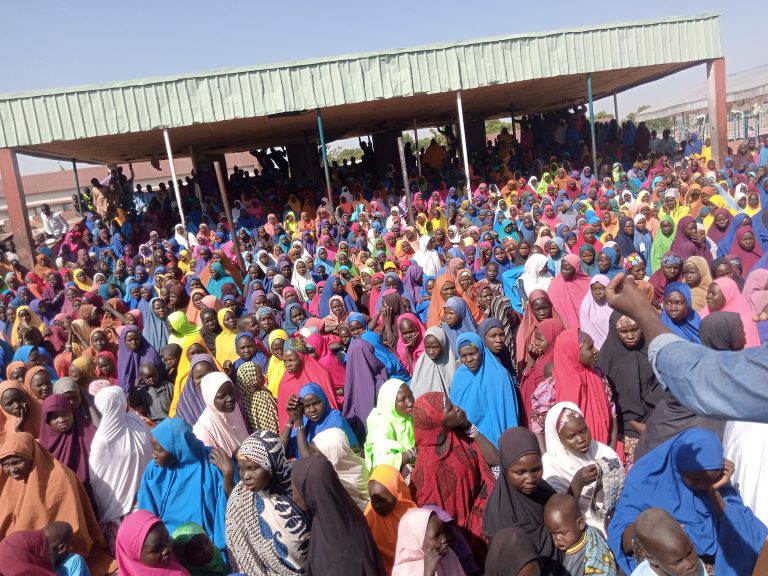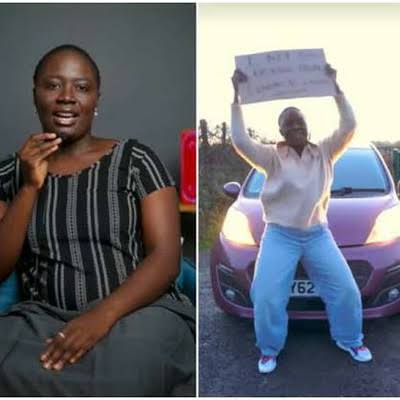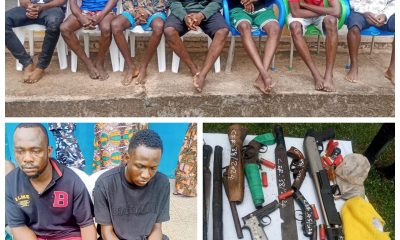Feature
X-raying handling of surrendered terrorists, rescued women and children in Borno

X-raying handling of surrendered terrorists, rescued women and children in Borno
By Sumaila Ogbaje
The push by the Nigerian Armed Forces to end insurgency in the North East of the country has so far led to the surrender of 82,237 fighters and their families since July 2021.
The bulk of the surrendered fighters of Boko Haram and Islamic States West Africa Province (ISWAP) terrorist groups, were women and children of the fighters and others rescued by the military.
The administration of this huge number of combatants and their families has raised immense interest from local and international stakeholders.
Nigeria has been confronting insurgency and terrorism in the North Eastern states of Borno, Adamawa and Yobe for over a decade.
Borno being the epicenter of the insurgency have also had to battle with the devastation and destruction of lives and property occasioned by the war.
The challenge of insurgency had led to militarization of the entire region since 2010 with the operationalisation of Joint Task Force Operation that has transformed in name and scope since 2013, till date.
The current Joint Task Force NorthEast Operation Hadin Kai, which was reorganized and recalibrated in 2021, has achieved milestone in dealing with the menace leading to mass surrender of Boko Haram and ISWAP terrorists alongside their families.
So far, available records show that over 82,237 fighters and their families have surrendered since July 2021, out of which 16,577 were active male fighters, 24,499 women and 41,161 children.
These figures exclude those that were arrested and awaiting prosecution, or rehabilitation and reintegration.
This category of terrorists are being held at the Joint Investigation Centre (JIC) at Giwa Barracks in Maiduguri, the Borno capital and Kainji in Niger State.
The JIC is for temporary holding and investigation of suspected and confirmed arrested terrorists.
Currently, there are a total of 1,893 of such suspects in custody, out of which 886 are awaiting transfer to Giwa Project in Kainji for prosecution.
A total of 323 of them were recently transferred to Operation SAFE CORRIDOR in Gombe for the de-radicalisation, rehabilitation and reintegration programme.
At the JIC, there are a number of female detainees who also have children with them. One of them is Aisha Ibrahim, mother of little Muhammadu, who have spent a year and some months at the detention facility.

Aisha Ibrahim with son Muhammadu at JIC in Maiduguri
Majority of the female detainees are wives of suspected and arrested Boko Haram terrorists who have been profiled and categorized for either prosecution or deradicalization, rehabilitation and reintegration.
Aisha was pregnant at the time she was apprehended. She gave birth to little Mohammadu, her only son, on May 15, exactly seven months ago.
When asked by the News Agency of Nigeria (NAN) on whether she ever thought of aborting the pregnancy after her rescue, her response was no.
Also asked if she was ever told to get rid of the pregnancy by anyone, be it the military or government officials, she also responded no.
According to her, she was adequately taken care of during the pregnancy up to delivery.
Aisha added that since she gave birth, little Mohammad has been receiving immunisation to prevent him from contracting childhood killer diseases.
The immunization card of the little boy cited by NAN revealed that he took another immunization on Nov. 28, at the military medical facility.
Repentant or surrendered Boko Haram/ISWAP terrorists
At the Hajj Camp, one of the holding facilities where about 15,000 repentant terrorists and their families were being housed by the Borno State Government, there are well over 10,000 women and children including new born.
The Medical Officer in Charge of the camp’s health facility, Muhammed Saleh said a total of 252 babies were born between July and October this year, adding that majority of the women came into the camp with pregnancy.
RELATED STORY: Gov Adeleke Makes U-Turn On Sacking Of 12,000 Workers, 3…
Saleh said that the camp currently has hundreds of pregnant women who were being catered for adequately, adding that new babies were being delivered on daily basis.
Falmata, a 19-year-old pregnant woman, told NAN that she had spent six years in the bush with her terrorist husband before she surrendered alongside other families about six months ago.

Falmata who revealed that her husband was still in the bush, said that she was two months pregnant before coming to the camp.
She said the government has been taking care of her medical and other needs, and expressed hope of reuniting with her parents soon.

Some Rescued Chibok School Girls and their Children
At the Bulumkutu Interim Care Centre (ICC) where 14 Chibok school girls recently rescued by the militare were being rehabilitated, it was a story of joy and pains for 25-year-old Rejoice Sanki (serial no.70), who was rescued with her two children.

Rejoice and son Sanki
Narrating her ordeal, Sanki told NAN that she was forced to marry a terrorist, who she intensely “detested even while remembering his name and face”. Sanki said she was tortured when she initially refused to marry the terrorist, but had no option than to do what they wanted.
The Chibok girl said she was lucky to escape with her children and was rescued by the military.
She thanked the government for taking care of her and her children, adding that reuniting with her parent and being able to go back to school remained her earnest expectations.
“When I was in Chibok school, I was a science student and my ambition was to become a medical doctor. I have suffered very well because this is not who I was and what I wanted to become,” she said.
Also, Yana Pogu (24), serial number 19 on the missing Chibok girls list, who was rescued with her four kids, including a set of twins, said her greatest desire is to reunite with her parents and take good care of the children.
Pogu said the Borno government had been taking good care of them and their kids, but would like to go back to school to be educated again, so as to be useful to her family and the society.
Separated Children
At the same centre, there are about 1,000 children separated from their parents as a result of the insurgency. Their parents are yet to be located.
The children are however being catered for educationally, medically and mentally by the state government.
The Commissioner for Women Affairs and Social Development, Hajia Zuwaira Gambo, said that 118 of the children would be reunited with their parents in a couple of days.
The role of the military and NGOs
The Theatre Commander, Joint Task Force North East Operation Hadin Kai, Maj.-Gen. Christopher Musa, said the counter-insurgency operations of the military was 75 per cent non-kinetic, with just 25 per cent kinetic activities.
Musa said the military, being the first responder and first point of contact with the terrorists at the point of capture or surrender, had been actively involved in humanitarian support services for both rescued and surrendered Boko Haram and ISWAP terrorists and their families.
He also said the military had continued to operate within the provision of humanitarian laws in line with global best practices with regards to handling of arrested and surrendered terrorists, as well as rescued victims of insurgency.
Musa said the military remained committed to providing needed support to the state government, public agencies, as well as local and international NGOs and CSOs operating in the state.
However, an interaction between journalists and NGOs on Nov. 29, showed that foreign NGOs shy away from talking to Nigerian media as they were evasive about disclosing the role they play in addressing humanitarian issues in the North East.
Brian LaGuardia, Head Civil-Military Coordination, United Nations Office for Coordination of Humanitarian Affairs (UN-OCHA), who spoke on behalf of the 245 INGOs and domestic NGOs said he would not be able to speak on the issues.
He was evasive when further asked to give assessment of the ongoing operations and the handling of rescued women and children.
The Commander, 7 Division Medical Services and Hospital Maiduguri, Lt.-Col. Adeniyi Ogunsakin, said the hospital was largely dedicated to managing wounded troops and barracks’ residents.
He however said that the facility had attended to few cases of wounded and rescued victims of Boko Haram insurgency.
Ogunsakin said the military had also attended to the rescued Chibok girls and their children because of the peculiarity of their case.
He said one of the Chibok girls who was rescued, came in with pregnancy and two babies and the hospital had to take care of her and the children.
Ogunsakin said she was later released to the theatre command and subsequently handed over to the state government after the hospital ensured that she was clinically stable.
On whether the hospital performs abortion for women that came out of terrorists’ dens with pregnancy, Ogunsakin said the hospital had never performed abortion on any of the women, either on request or through any other person.
“We don’t have the power to terminate anybody’s pregnancy in this hospitals and even if a mother tells us, we don’t grant such request because it is against our practice,” the commander added.

Feature
Nurturing Boy-Child to Save the Girl-Child

Nurturing Boy-Child to Save the Girl-Child
By Vivian Ihechu
In most cultures, especially in Africa, preference to the boy-child has strong cultural, religious, legal and of course, social status.
This is principally because a male heir is needed to continue the family line.
The boy-child, faced with many challenges, especially in the 21st century, is often times not properly guided; hence the society tends to be losing him.
The African Charter on the Rights of the Child defines a child as anyone below the age of 18; hence a boy-child is a male offspring below the age of 18 years.
Unlike the boy-child, the girl-child has received massive campaign for her rights and protection, with increasing mainstream attention in public health care from the early 2000s.
While several initiatives to protect the female gender have continued to emerge, those for the male are sparse.
The female-centered initiatives include, inter alia, the International Day of the Girl Child, and UN’s coordinated International Conference on Population and Development (ICPD), Cairo in 1994, and the 1995 Beijing Conference that highlighted concerns on women and girls’ empowerment and autonomy.
The initiatives also include laws and regulations against women trafficking and application of criminal laws to under-age sex, child-brides, and sex work
However, it is worthwhile to note that all children are future leaders of tomorrow and custodians of the future.
As such, the first aim of every family and society should be to raise healthy and productive individuals who are physically, psychologically, society and mentally well developed.
Analysts say that neglecting issues affecting the boy-child sets foundation for unbalanced male adult especially as he is the “father’’ of tomorrow, taking charge of families and females who leave their birth families after marriage.
Recognising the importance, the United Nations in 2018, adopted May 16 every year as the International Day of the Boy Child.
It was championed by Dr Jerome Teelucksingh, a university lecturer from the Republic of Trinidad and Tobago.
The day focuses on boys and their well-being, their needs to feel happy, healthy, and valued within family and community.
Dr Naeem Dalal, Advisor, Non-communicable Diseases, Injuries and Mental Health for Africa CDC, affirmed that boys were not taught to reach out for help; and this had detrimental effects.
“Men are supposed to be responsible and breadwinners in communities; showing that part of vulnerability is not something that is accepted in our communities across the African continent in general.
“And not just to stereotype it, but also to be factual that men are also taught not to be reaching out for help growing up as boys and boys are told to be strong and responsible.
“So, this also causes an issue for men to reach out for mental health services, even when they are there; they may end up committing suicide.
“These are the challenges we are facing; the boy-child is also human,’’ he said.
He advocated looking at mental health advocacy for communities, also in the direction of men’s health.
Commenting on the boy-child, Ms Ifeoma Ibe, a Counsellor, said that boys , in the African setting, were brought up to be macho and it was reiterated in the family, school and church.
“Some of the prototypes instilled in their minds are that the boy-child is stronger, usually more intelligent and more powerful than girl-child, and therefore, does not need protection as girl-child.
“He is not expected to express his emotions or any weaknesses; he is to bear things, good or bad, `like a man’.
“He is taught not to cry but always behave in a brave manner since boy-child is not to display their weakness; they tend to suffer in silence.
“Society teaches males that they must be in control all the times,’’ she said.
Mrs Vivian Emejuobi, a Wellness Specialist, advised parents to invest time in training their male children to become responsible adults.
“If the boy-child is properly groomed and nurtured, there will not be a girl-child abuse.
“This proper education will encompass how to treat the opposite gender and it will help to reduce rape and abuse cases in the society.
“So, the same energy that parents use to bring up the girl-child should be replicated in the upbringing of the boy-child.
“Massive advocacy and sensitisation is required to educate the boy-child to become better persons in the future,’’ she said.
A Nigerian author and novelist, Gbenga Sokefun, said that on human trafficking , efforts had been mostly on the girl-child.
According to him, the focus of these efforts has been primarily on female children, trafficked for purposes of prostitution and other forms of indentured servitude.
However, he called on leaders to also concentrate on human trafficking of the boy- child.
Sokefun, the author of a fiction, “Adigun”, said that trafficking of the African boy- child had received far less attention, despite the simple fact that it existed.
“The pressures of poverty and the inherent psychological damage of colonialism have resulted in a brisk trade of young African boys and men under the auspices of narcotics smuggling.
“The perpetrators have created a pathway for the African male child whose solution to the inadequacies of the continent is escape to the ‘greener’ pastures of the Americas, Europe or anywhere away from the continent of Africa.
“They prey on the dreams and desires of these gullible children who seek a better life on other continents.
“These should be tackled,’’ he said
Lending their voices, some clerics said that bringing up the boy-child properly is a social responsibility that parents cannot delegate to others.
Pastor Chris Nmezi of the Spoken Word Ministry, Ojo Barracks, Lagos, advised parents to conduct themselves in exemplary manners , such that the children would follow same.
He described parents that quarrel and batter each other in the presence of the children as mentally deforming the children.
Nmezi cautioned parents to discard uncomplimentary habits towards others especially their spouses to prevent children from coping habits that would portray them as never do wells.
“As gatekeepers whatever we condole or instill in the heads of the children by our actions or inactions that they will acquire.
“Any boy that grows up seeing her mother being beaten by his father will see it as a tradition to beat his wife later in life,” he said.
Sharing similar sentiments, Pastor Gladys Ododo urged parents not to do that which they would not be happy seeing their child indulge in.
Ododo said that parents especially men, indulge in drinking alcohol even around the home but would not like to see their children of school do same.
“It is hypocritical; if you don’t want them in it, then stop it; children copy with ease what they see parents do than what parents told them.
“Rising up voice at your spouse at every infraction or detestable conduct is sending wrong signal in the children and people around.
“If there is need to correct anyone do so courteously without attracting unnecessary attention,” she said.
As a way to help the boy-child, Mr Gaius Edem, a teacher, urged parents to encourage their boy-child to engage in exercise, extra curriculum activities such as belonging to a positive club.
“Parents, guardians and educators can encourage the boy-child to join positive clubs in schools or their religious gatherings.
“It will also help young and growing child to channel their time and energy to meaningful and healthy activities,’’ he said.
In her input, Mrs Rosita Agomuo, an Educationist and Executive Coordinator of Safe mamahood, agreed that boys had been relegated to the background, as all attentions were on the girl-child.
Agomuo said that the interest of boys should be protected because they are also victims of abuse.
“These abuses also affect boys psychologically but we do not always hear about it in the media; the focus has always been on the girl-child.
“I believe CSOs and NGOs need to do more for the boy-child too by focusing on their peculiar needs and challenges to achieve gender equality,” she said.
All in all, experts of the view that good training of a boy-child will help to achieve a safer world for the girls/women and humanity at large.
They say if well nurtured and groomed, the boy-child will conscientiously carry, just like the girl-child, the responsibility of fostering understanding, empathy and equality; thereby making a harmonious world for all.
Nurturing Boy-Child to Save the Girl-Child
Feature
Pelumi Nubi’s London-to-Lagos journey and West Africa’s border realities

Pelumi Nubi’s London-to-Lagos journey and West Africa’s border realities
By Mark Longyen & Tosin Kolade
When travel content creator Pelumi Nubi embarked on her 68-day solo journey from London to Lagos a few months ago, little did anyone anticipate the beauty, excitement, and challenges that would unfold.
She embarked on a journey from London through France, Spain, and Morocco before venturing into the West Sahara Desert.
From there, she continued her expedition through Mauritania, Senegal, The Gambia, Guinea-Bissau, Guinea, Sierra Leone, Liberia, Mali, Burkina Faso, Côte d’Ivoire (Ivory Coast), Ghana, Togo, Benin, and on the other end arrived in Lagos, Nigeria on April 7.
Pelumi made history as the first black woman to complete a solo drive from the United Kingdom to Nigeria, garnering accolades and recognition worldwide for her remarkable achievement.
Fans greeted her arrival with cheers, having closely followed her journey online.
In recognition of her extraordinary feat, the Lagos State government bestowed upon her a new car, a house, and an ambassadorship for state tourism.
While the journey progressed, the solo trip revealed the beauty, culture, and traditions of all the countries she visited.
However, a major highlight was the difficulty and delay in moving past the West African borders as a British-Nigerian citizen with the required travel documents.
Different passport checks, attitudes of border security officers, and seemingly deliberate delays, were shown on her social media page, Instagram, with millions of viewers.
According to Pelumi, she hopes to use her platform to create an awareness campaign for improving freedom of movement for people in the African region.
Pelumi is not alone in the narrative about the frustrating and agonising road-travelling experiences on the borders of member states by ECOWAS citizens.
Doris Brown, Deputy Secretary-General, Lions Club District 40382, comprising Liberia, Sierra Leone, Ivory Coast, and Togo, who experienced the same, urged Customs and Immigration officers to treat ECOWAS citizens, who cross the sub-regional borders by road with dignity and respect.
Like Pelumi, she said that 29 of the club’s members, while traveling to Togo by road from Liberia through Ivory Coast, and Ghana for their district convention, were subjected to agonizing hours of delays due to relentless searches at checkpoints.
According to her, by the ECOWAS protocols, people should travel freely without taking a visa from member states, as ECOWAS Heads of State have signed the protocols, so people should not be treated “inhumanly as if we came from space.”
“ECOWAS needs to have a second look at the relationship between its member states, especially with the ordinary citizen who embark on a journey by road.
“Each member state needs to ensure security, but as ECOWAS citizens, they should be accorded some respect and dignity.
“These were not part of the dreams of the founding fathers of ECOWAS for the ECOWAS citizens and Africa as a whole. If we cannot be respected at our borders and ensure free movement, what is the reason for having ECOWAS?” Brown queried.
Critics say that in spite of the signing of the African Continental Free Trade Area (AfCFTA) and the ECOWAS protocol on the free movement of persons and goods, challenges persist regarding the free movement of people and goods in the West African sub-region.
The free trade agreement, brokered by the African Union (AU) and signed in Kigali, Rwanda on March 21, 2018, aims to establish a single market for goods and services in Africa, promote the free movement of people, and drive economic growth and development across the continent.
With 54 signatories, the AfCFTA is the largest free trade area by member states after the World Trade Organisation, encompassing over 1.3 billion people and vast geographic regions.
It envisions provisions for visa-free travel, residency rights, and the absence of movement barriers, enhancing economic integration and regional cooperation.
While policymakers see labour movement as crucial to the success of the continental free trade agreement, not all African countries fully support the idea.
Additionally, alongside the AfCFTA agreement and the Kigali Declaration, 30 African nations signed the Protocol on Free Movement of Persons, aiming to establish a visa-free zone within AfCFTA countries.
The ECOWAS protocol on the free movement of goods and people promotes regional integration and economic progress among its member states.
The Protocol on Free Movement, Right to Residency, and Establishment, mandates member-states to allow ECOWAS citizens with valid documents the right of entry into their territories under the provisions of the protocols.
ECOWAS member states are also required to adopt measures to ensure that ECOWAS citizens enjoy to the full the rights granted in the Protocol.
Dr Matthew Ogali, a researcher from the Department of Political and Administrative Studies at the University of Port Harcourt, highlighted one of the objectives of ECOWAS as promoting trade and commerce among member countries.
He identified various institutional and non-institutional barriers hindering the free movement of people and goods, such as excessive customs checks and entry restrictions.
According to him, after forty-nine years of existence, ECOWAS has primarily thrived in the informal trade sector, characterised by small-time entrepreneurs conducting business across borders with minimal adherence to established trade policies.
Ogali noted that this informal trade environment has also fostered criminal activities like smuggling and cross-border armed banditry, resulting in significant losses of goods and, at times, lives.
“Despite its resilience over the past forty-nine years, ECOWAS has struggled to translate many of the documents produced by its intellectual community, often seen as scholarly discourse, into practical policy implementations.
“This gap between academic insights and policymaking poses challenges for addressing the region’s problems effectively.
Prof. Charles Ukeje of the Department of International Relations, Obafemi Awolowo University, OAU, Ile-Ife, while commenting on Pelumi’s experience at the borders of ECOWAS countries, said her challenges may have been unrelated to any deficiencies in the ECOWAS protocol on the free movement of its citizens.
He said: “One would not know whether she was carrying a British passport or a Nigerian/ECOWAS passport during the trip, which would have guaranteed her free movement, or otherwise, within the subregion in line with the ECOWAS protocol.
“Also, we need to know whether the passport she carried had expired or was invalid at the time she was traveling, which may have necessitated scrutiny by security officials at the borders.”
Corroborating Prof. Ukeje’s view, ECOWAS Director, Free Movement of Persons and Immigation, Albert Siaw-Boateng, said that the delay experienced by Pelumi at the points of entry or exit could not be attributed to any weaknesses in the implementation of the protocol.
He said that due to the prevailing security challenges in the region, triggered by terrorism and violent extremism, ECOWAS’ security architecture necessitated thorough checks on travelers by security officials without impeding the free movement of community citizens within the region.
According to him, the protocol also gives room for National Laws to take precedence, hence, there are inconsistencies in the implementation of the protocol by individual member states.
“It is also to be noted that even though all member states have signed up to the Free Movement Protocol, it gives room for National Laws to take precedence.
“In this regard, there are inconsistencies in the implementation of the protocol by Member States.
“So, any delay at the point of entry or exit cannot be attributed to weaknesses in the implementation of the protocol,” he said.
Dr Omar Touray, President of the ECOWAS Commission, speaking on the Free Movement Protocol recently, noted that: “Free Trade moves with Free Movement of persons and goods.”
ECOWAS Commission Headquarters, Abuja.
Touray said that ECOWAS had been implementing joint border posts, which brought together border officials of two neighboring countries to carry out joint operations, to ease cross-border crossing, which sometimes took cognizance of respective member states’ laws.
“We have built a joint border between Nigeria and Benin at the Seme-Krake border, and between Togo and Ghana at the Noepe-Akanu border. These border posts are now operational.
“There is another border post that has been made operational between Nigeria and Cameroon at the Ekok-Mfun area. This was financed by the African Development Bank,” he said.
The creation of the ECOWAS protocol on the free movement of persons and goods on May 29, 1979, to facilitate a borderless ECOWAS, is a cardinal scheme of the bloc’s integration programme, aimed at moving from an ECOWAS of states to ECOWAS of people.
The Protocol adopts the removal of roadblocks and security checkpoints on intra-ECOWAS international highways, the introduction of a single ECOWAS passport, and a Schengen-type visa for the community’s citizens, among others.
Experts say this has fostered regional integration and development by boosting citizens’ mobility, which has yielded multi-sectoral benefits and contributed to key developments in the ECOWAS subregion.
They emphasise that effective policy implementation and addressing institutional barriers will fully realise the benefits of regional integration in West Africa.
Pelumi Nubi’s London-to-Lagos journey and West Africa’s border realities
Feature
THE BEAUTY OF CLASSMATE

THE BEAUTY OF CLASSMATE
By Dada Emmanuel Olayinka
- Classmates Are Family.
- Avoid Things That Divide Family.
- In Class You Would Always Be ABUBAKAR, EMEKA and ADEWALE etc Despite the PhD, SAN, Hon, Chief, General, Prof, Mr, Dr, Rev, Ustaz etc.
- Check On, Reach Out To Classmates Who May Be Less Successful.
- Achievements Are Processes Not Destination; Everyone Has His Time.
- Class Groups Are Not Places For Intimidation But Co-operation.
- Classmates Are Not Political Or Cabal Groups
- Be Humble and Sincere With your Classmates, They Knew You When You were Nobody.
- A United Class Is a Successful Class, No Matter Who Succeeds First.
- Never Treat Classmates Like Employees..
- Be Kind To Classmates, Table Can Turn in Future.
- 💰 Money Can’t Buy You Classmates’ Support When You are In Trouble.
- Forgive Classmates’ Mistakes ,They are Human.
Many years ago I was working as a clerk at a faculty in one popular university in Nigeria, then I saw an advert for NDA (Nigeria Defence Academy), I have always loved to go to NDA so I applied, submitted my form and was called for admission examination.
Read Also: Defence Ministry Inaugurates Committee To Review Veterans Federation Bill
I had to travel to Kaduna all the way from Osun State, I have a distant uncle that was resident there then. I wrote a letter (no telephone at the time) to my uncle that I was coming to sit for an exam in Kaduna and would love to stay in their house.
I didn’t get a reply to my letter even as my departure date was approaching. I became so worried because I needed to go anyway, as I was talking to a colleague in the office concerning my fear of where to stay, our office cleaner who was a Hausa man overheard us and in his broken English interjected that he knew someone right inside NDA.
Who could he know there? Is it not a cleaner like himself, I unintentionally said it out to his hearing. “Oga no o, the commandant op za NDA na ma classmate and ma priend”. In his bad handwriting, he scribbled the commandant’s name on a piece of paper. “Just mention my name’s por am, him go helf you.”
I reluctantly collected the paper from him, not because I intended to make use of it but because I didn’t want him to feel bad.
The next day, I set out on this long journey by train from Osogbo. I got to Kaduna a day later towards evening. Upon getting there, I went straight to my uncle’s house only to find out that they had relocated from that place and no one knew their new address. I became stranded and it was getting late.
Around after 7pm, I made up my mind to give my cleaner’s contact a shot. I got to the gate of NDA and mentioned the name I was given. To my utmost surprise, everyone in that bit, recognized the name and one person was promptly detailed to take me to his office.
I gave the paper where Kabiru wrote his name and that of his friend to the secretary who took it inside. On sighting the paper, the commandant shouted from the office and followed the secretary outside to usher me in. “Where do you know Kabiru?” “He’s my colleague in the office, Sir,” I answered.
“Where is he? How is he? Hope he’s doing well?” This man was asking me many questions in an obvious excitement.
The look on his face confirmed to me that Kabiru was his beloved friend. He asked me what I came to do in Kaduna and I said it was for the NDA exams. “Wow, do you have where to sleep?” “No, sir.” He immediately called someone to take me to his house. On getting to the house, I was lavishly entertained.
This man came late in the night and he woke me up and took me up on tutorials for the next day’s exams. After the exams, he personally drove me to the park the next day.
When I got back to the campus, I began to look at Kabiru with a different eyes. How on earth does this man know such a powerful person? Needless to say, my name was number four on the list when the results came out.
Friends, I put it to you today that relationship is a currency. Every man needs another man to move up and that man may be the neighbour you look down on, maybe the taxi driver you so despise or even the house help you think is a nobody today.
Relationship is a stream of income. Everything in life actually reproduces on the basis of relationship. Those we know in life matter. Most of us are talented but we need a cupbearer that will tell Pharaoh that there’s a Joseph that can interpret dreams. we need our old school mates irrespective of their status today.
Hook up with your class mates in the primary, secondary and tertiary schools alumni.
There are some heights you may never get to in life until someone tells someone about you even in church or mosque. Therefore, shut the door on relationships gently. You may need to use it tomorrow.
Let us take our relationships seriously. Even if you meet onoline, don’t look down on anyone. You never can tell which of the relationships will be your own key to success
THE BEAUTY OF CLASSMATE
-

 Education11 months ago
Education11 months agoMathematics Teacher Reportedly Stung By Bee While Preparing Students For Exam
-

 Health3 weeks ago
Health3 weeks agoOnly 58,000 doctors renewed licence out of 130,000 registered doctors – MDCN
-

 News1 year ago
News1 year ago3 escape death in Ore-Sagamu expressway accident
-

 Politics4 weeks ago
Politics4 weeks agoAPC IN A FIX AS GOVERNORSHIP ASPIRANTS REJECT THE ONDO STATE PRIMARY ELECTION RESULTS
-

 Crime3 weeks ago
Crime3 weeks agoPolice arrest cultists who killed rival in his daughter’s presence
-

 National3 months ago
National3 months agoResidents gather to scoop engine oil as tanker falls in Ojuelegba
-

 Sports3 weeks ago
Sports3 weeks agoAsaba to host Wheelchair Basketball Atlantic Conference League
-

 Business12 months ago
Business12 months agoNew Rates: ‘I borrowed money to finance this business…’ – Petroleum Marketer cries out over Non-supply of products by the NNPCL



